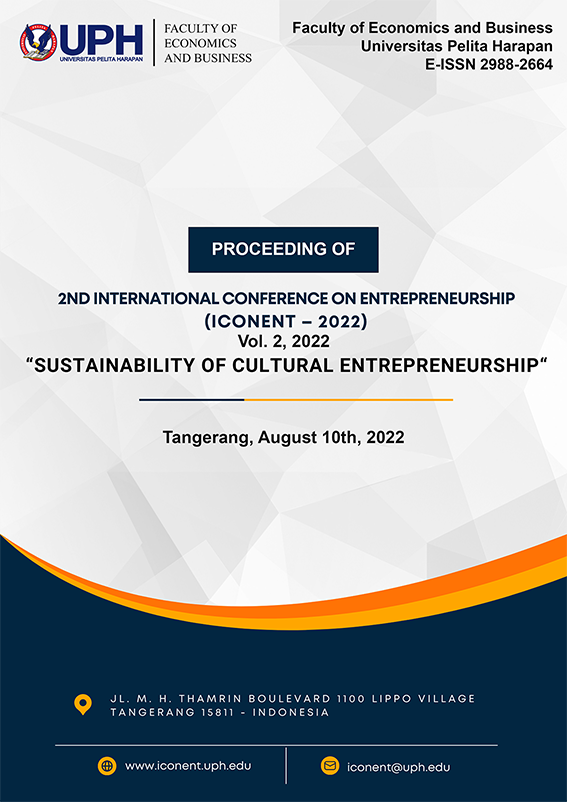INFORMATION ASYMMETRY, MARKET REACTION AND COMPANY PERFORMANCE: PRE AND DURING THE COVID-19 PANDEMIC
Keywords:
Covid-19, firm performance, information asymmetry, market reactionAbstract
This study examines the effect of information asymmetry and market reaction on company performance before and during the Covid-19 pandemic. The population in this study are all listed companies on the Indonesia Stock Exchange except for the financial sector with the 2018-2020 observation year. We define the observation period as pre- pandemic (2018-2019) and during the pandemic Covid-19 (2020). This study used the purposive sample selection method and obtained 953 observations. Using multiple linear regression analysis models, our study finds evidence that information asymmetry negatively affects firm performance. During the Covid-19 pandemic, this study finds weak evidence of the moderating role of Covid-19 on the relationship between information asymmetry and performance. Furthermore, this study found no evidence that the company's performance gave a market reaction, measured by the earnings response coefficient, but in the Covid-19 pandemic period, the company's performance gave a positive market reaction.
References
[1] W. Hadiwardoyo, “Kerugian ekonomi nasional akibat pandemi Covid-19,” Baskara: Journal of Business and Entrepreneurship, vol. 2, no 2, pp. 83-92, 2020. https://doi.org/10.24853/baskara.2.2.83-92
[2] H. Shen, M. Fu, H. Pan, Z. Yu, and Y. Chen, Y., "The impact of the COVID-19 pandemic on firm performance, "Emerging Markets Finance and Trade, vol. 56, no. 10, pp. 2213-2230. https://doi.org/10.1080/1540496X.2020.1785863
[3] H. Liu, A. Manzoor, C. Wang, L. Zhang, and Z. Manzoor, "The COVID-19 outbreak and affected countries stock markets response," International Journal of Environmental Research and Public Health, vol. 17, no. 8, pp. 1-19, 2020. https://doi.org/10.3390/ijerph17082800
[4] M. Nugroho, D. Arif, and A. Halik, "The effect of financial distress on stock returns, through systematic risk and profitability as mediator variables," Accounting, vol. 7, no. 7, pp. 1717-1724, 2021. https://doi.org/10.5267/j.ac.2021.4.026
[5] J. Jindra, and T. Moeller, "Time since targets' initial public offerings, asymmetric information, uncertainty, and acquisition pricing," Journal of Banking and Finance, p. 118, 2020. https://doi.org/10.1016/j.jbankfin.2020.105896
[6] A. Khatali, "Identifying effects of information asymmetry on firm performance," International Journal of Economics, Finance and Management Sciences, vol. 8, no. 2, p. 75, 2020. https://doi.org/10.11648/j.ijefm.20200802.12
[7] A. Hamudiana, and T. Achmad, “Pengaruh tekanan stakeholder terhadap transparansi laporan keberlanjutan perusahaan-perusahaan di Indonesia,” Diponegoro Journal of Accounting, vol. 6, no. 4, pp. 226-236, 2017.
[8] K.R. Kusumayanti, and A.A.G. Suarjaya, “Reaksi pasar modal indonesia terhadap pengumuman kemenangan Donald Trump dalam pilpres Amerika Serikat 2016”, E-Jurnal Manajemen Universitas Udayana, vol. 7, no. 4, p. 1713, 2018.
[9] E.P. Akbar, I.S. Saerang, and J.B. Maramis, “Reaksi pasar modal terhadap pengumuman kemenangan presiden Joko Widodo berdasarkan keputusan KPU pemilu periode 2019-2024 (Studi pada perusahaan BUMN yang terdaftar di BEI)”, JMBI UNSRAT (Jurnal Ilmiah Manajemen Bisnis Dan Inovasi Universitas Sam Ratulangi), vol. 6, no. 2, pp. 123-131, 2019.
[10] M.C. Jensen, and W.H. Meckling, "Theory of the firm: managerial behavior, agency costs and ownership structure", Journal of Financial Economics, vol 3 no. 4, pp. 305-360, 1976.
[11] F. Hakim, and M.A. Omri, "Quality of the external auditor, information asymmetry, and bid-ask spread: Case of the listed Tunisian firms", International Journal of Accounting & Information Management, vol. 18, no. 1, pp. 5-18, 2010.
[12] H. Yoon, H. Zo, H., and A.P. Ciganek, "Does XBRL adoption reduce information asymmetry?", Journal of Business Research, vol. 64, no. 2, pp. 157-163, 2011.
[13] K.H. Chung, and S.W. Pruitt, "Simple of Tobin's approximation Q", vol. 23, no. 3, pp. 70-74, 1995.
[14] W.P. Dewi, and A. Herusetya, "Market Response toward accrual earnings management, real transactions, and strategic revenue recognition - earnings management," Jurnal Akuntansi Dan Keuangan, vol. 17, no. 2, pp. 71-81, 2016
[15] L. Cui, P. Kent, S. Kim, and S. Li, "Accounting conservatism and firm performance during the COVID-19 pandemic," Accounting and Finance, vol. 61, no. 4, pp. 5543-5579, 2021.
[16] J. Conrad, B. Cornell, and W.R. Landsman, "When is bad news really bad news?" The Journal of Finance, vol 57, no. 6, pp. 2507-2532, 2002.

 Fakultas Ekonomi dan Bisnis | Universitas Pelita Harapan | Kampus Universitas Pelita Harapan | Gedung F Lt. 12 | Lippo Karawaci, Tangerang - 15811 | Telp 021-5460901 | Fax 54210992
Fakultas Ekonomi dan Bisnis | Universitas Pelita Harapan | Kampus Universitas Pelita Harapan | Gedung F Lt. 12 | Lippo Karawaci, Tangerang - 15811 | Telp 021-5460901 | Fax 54210992